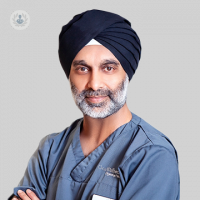Understanding the role of gut bacteria
Escrito por:In the 4th century AD, a traditional Chinese medical doctor called Hong prescribed a drink made of human faeces to treat food poisoning or severe diarrhoea. Hundreds of years later, we have realised that Ge Hong may have stumbled across a smart idea. Scientists have identified that the bacteria that live in our guts form a dynamic and complex ecosystem. Our gut bacteria seem to digest food and supply nutrients, which our bodies would otherwise be unable to utilise.
The effects of this may reach far beyond the gut itself and have knock-on effects to other aspects of our physiology, including our immune system and even potentially our mental health. Here, leading London gastroenterologist Dr Devinder Bansi explains the important role that bacteria plays within the body.

How do gut bacteria work?
The bacteria within the gut form a community often referred to as the gut microbiota. Each species seems to serve a different purpose with some breaking down food remains and converting these into other substances, which can then potentially be used by other bacteria.
How does bacteria affect the body?
The large intestine contains 100 trillion bacteria with over 1000 different types. Alone our body is unable to break down dietary fibre and many of the starchy molecules found in the plants we eat. The gut bacteria ferment the fibre and starches to produce fatty acids, which the gut can then utilise as fuel. These fatty acids also reach other organs such as the liver and are converted into fats or sugars for storage. Gut microbes produce vitamins including B vitamins (needed for cell metabolism) and Vitamin K (required for coagulation). Molecules produced by the gut bacteria could also affect the way we respond to medication including Paracetamol and statins. Bacteria seem to keep infections at bay by potentially crowding out disease-causing organisms and producing toxic substances to destroy them.
Our bodies also shape our microbiota. The immune system decides which bacteria get to join our microbial population as do our genes and what we eat. When scientists started deciphering the microbiota, they expected to find a core set of species that everyone held in common. However, the reality is that combinations and abundances of species vary from person to person.
What’s the role of biodiversity?
Having a variety of bacteria, or biodiversity, in the gut is important and it does seem that some diseases may be caused by a lack of this biodiversity. The classic example is Clostridium difficile diarrhoea. This bacterium normally lives harmlessly in the gut, where its growth is controlled by other microbes. However, administration of broad-spectrum antibiotics often destroys these other microbes, which allows the Clostridium difficile to proliferate and spread causing disease.
Biodiversity or the lack of it may also be important in other diseases, such as ulcerative colitis and Crohn’s disease. The role of the microbiome in disease causation is not entirely clear and it remains to be established whether changes to the microbiome are the cause of the disease or whether the disease causes the microbiome to change. However, what is clear is that the microbiome does have a role to play and therefore manipulating it in some way and restoring a balance in the gut may be of vital importance. such as sauerkraut, kefir, pickles and kombucha. In the case of Clostridium difficile, repopulating the gut with bacteria (via faecal transplantation) has been shown to be successful.
An easier way of introducing bacteria is where prebiotics and probiotics come in to play. Probiotics containing a range of different bacterial species are available and they do not dramatically alter the balance of species in the gut. Probiotics can be found in foods such as sauerkraut, kefir, pickles and kombucha. Prebiotics can be found foods such as onion, garlic, bananas, flax seeds and oats.
Do not hesitate to book an appointment with Dr Bansi if you feel that your gut bacteria is out of sorts.


